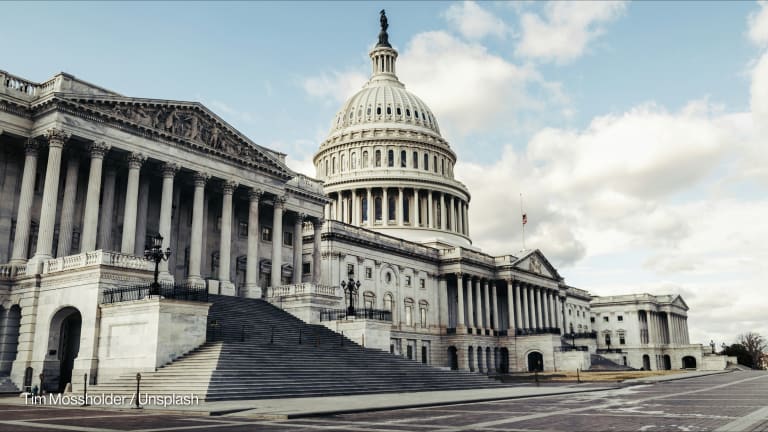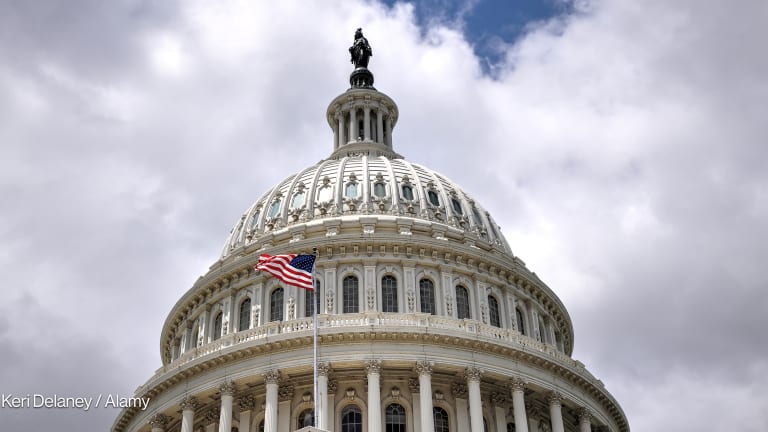House committee approves bill extending, enhancing US DFC
Lawmakers approved a measure that would extend the agency's ability to operate for seven years, double its investment cap to $120 billion, and also expand the number of countries where DFC can invest.
The U.S. development finance institution, which funds private sector development projects, may soon have an extended mandate and updates to its authorities that could allow it to work in more countries, take more risk, and better counter China’s economic development policies, with a key committee approving a bill to reauthorize the agency. If the bill passes, it would double the U.S. International Development Finance Corporation’s investment cap to $120 billion, change accounting methods allowing the agency to make more equity investments, and also expand the number of countries where DFC can invest. DFC was created in 2018 and its mandate will expire without a congressional extension next year. The House Foreign Affairs Committee hearing this week demonstrated that the effort to renew and update the agency has bipartisan support and that lawmakers want to act quickly. “This bill modernizes the DFC and maintains its development mandate, but most importantly, it strengthens the DFC’s ability to further our national security interest by allowing it to provide a better alternative to Russian projects and China's Belt and Road Initiative,” committee chairman Rep. Mike McCaul, a Republican from Texas, said at the hearing. McCaul and the top Democrat on the committee, Rep. Gregory Meeks, from New York, cosponsored the DFC Modernization and Reauthorization Act of 2024, which would extend the agency’s mandate for seven years. “This bill makes important modifications that will maximize the impact of DFC financing,” Meeks said. The changes will make it easier for DFC to increase equity investments. Currently, such investments are treated essentially as grants, with the expectation that it could lose 100% of the money. The bill proposes treating them more like loans, where a smaller pool of money can be leveraged to make more investments. DFC CEO Scott Nathan has explained that expanding equity investment capability would allow it to take more risk, partner with other institutions, and engage in investments earlier on and with more influence. Advocates and lawmakers have for years tried to solve the equity challenge, but they have thus far fallen short. “This fix will catalyze private sector investment, while also recognizing that equity stakes are expected to return money to the United States Treasury,” Meeks said. McCaul added that the change will also make taxpayer dollars go further as it allows the DFC to make more investments with the same amount of money from the U.S. Congress. The legislation also expands country eligibility to allow DFC to invest in an additional 34 countries — on top of the more than 100 permitted now — and creates a process for the agency to work in high-income countries, particularly where it serves an economic or national security interest. The bill specifies that DFC’s investments in upper-middle-income and high-income countries come with written justifications that they will produce development outcomes for the poorest people in the country and further national economic or foreign policy interests. It would also impose a limit of 10% of the total investment cap for high-income countries. The world’s 40 wealthiest countries would not be eligible for DFC funding. Some development advocates have expressed concerns that expanding the number of countries where DFC can work could undermine its development mandate. But Rep. Joaquin Castro, a Democrat from Texas, proposed changes to bolster DFC’s development focus. “This amendment would reinforce the need for the DFC to responsibly increase its risk tolerance and mobilize private capital,” particularly in upper-middle-income and high-income countries, he said. The bill urges DFC to take on more risk, in part by providing loan guarantees, offering insurance, increasing the use of blended finance, and taking a junior position in investments. Additional reporting requirements about private capital mobilization, or how DFC investments attract private capital, along with the development impact of projects, will also be required. Several other amendments were brought forward — one that encouraged DFC to work in the semiconductor industry and supply chain was approved, while others that would have barred DFC from investing in diversity equity and inclusion programs or any renewable energy projects, were defeated. There is a “tremendous need to mobilize more private capital investment in the developing world and this bill is a significant step forward to help the DFC do just that,” said Rob Mosbacher, Jr., who was CEO of DFC’s predecessor agency, in a statement. “Increasing DFC’s risk appetite and its use of de-risking mechanisms is critical so it can support more investments in difficult environments, where private capital is most needed,” he said. With this first step over, DFC’s renewal remains a way off. The House and Senate still have to pass the bill, which despite bipartisan support, faces a difficult legislative environment.
The U.S. development finance institution, which funds private sector development projects, may soon have an extended mandate and updates to its authorities that could allow it to work in more countries, take more risk, and better counter China’s economic development policies, with a key committee approving a bill to reauthorize the agency.
If the bill passes, it would double the U.S. International Development Finance Corporation’s investment cap to $120 billion, change accounting methods allowing the agency to make more equity investments, and also expand the number of countries where DFC can invest.
DFC was created in 2018 and its mandate will expire without a congressional extension next year. The House Foreign Affairs Committee hearing this week demonstrated that the effort to renew and update the agency has bipartisan support and that lawmakers want to act quickly.
This story is forDevex Promembers
Unlock this story now with a 15-day free trial of Devex Pro.
With a Devex Pro subscription you'll get access to deeper analysis and exclusive insights from our reporters and analysts.
Start my free trialRequest a group subscription Printing articles to share with others is a breach of our terms and conditions and copyright policy. Please use the sharing options on the left side of the article. Devex Pro members may share up to 10 articles per month using the Pro share tool ( ).
Adva Saldinger is a Senior Reporter at Devex where she covers development finance, as well as U.S. foreign aid policy. Adva explores the role the private sector and private capital play in development and authors the weekly Devex Invested newsletter bringing the latest news on the role of business and finance in addressing global challenges. A journalist with more than 10 years of experience, she has worked at several newspapers in the U.S. and lived in both Ghana and South Africa.








